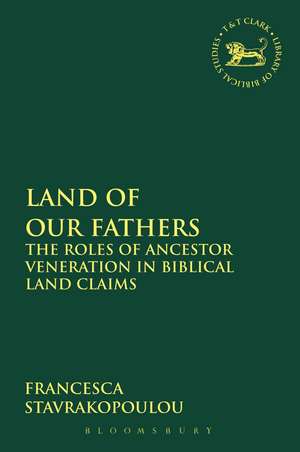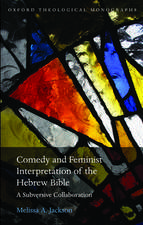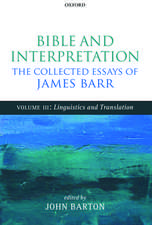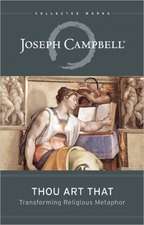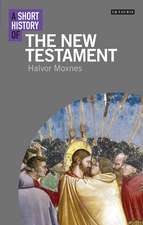Land of Our Fathers: The Roles of Ancestor Veneration in Biblical Land Claims: The Library of Hebrew Bible/Old Testament Studies
Autor Francesca Stavrakopoulouen Limba Engleză Paperback – 25 iul 2012
| Toate formatele și edițiile | Preț | Express |
|---|---|---|
| Paperback (1) | 256.20 lei 6-8 săpt. | |
| Bloomsbury Publishing – 25 iul 2012 | 256.20 lei 6-8 săpt. | |
| Hardback (1) | 831.43 lei 6-8 săpt. | |
| Bloomsbury Publishing – 15 dec 2010 | 831.43 lei 6-8 săpt. |
Din seria The Library of Hebrew Bible/Old Testament Studies
- 30%
 Preț: 599.90 lei
Preț: 599.90 lei -
 Preț: 159.16 lei
Preț: 159.16 lei - 30%
 Preț: 541.20 lei
Preț: 541.20 lei - 23%
 Preț: 192.01 lei
Preț: 192.01 lei -
 Preț: 99.40 lei
Preț: 99.40 lei - 30%
 Preț: 509.52 lei
Preț: 509.52 lei - 23%
 Preț: 192.36 lei
Preț: 192.36 lei - 30%
 Preț: 509.93 lei
Preț: 509.93 lei -
 Preț: 222.84 lei
Preț: 222.84 lei -
 Preț: 168.53 lei
Preț: 168.53 lei - 30%
 Preț: 655.82 lei
Preț: 655.82 lei - 22%
 Preț: 568.27 lei
Preț: 568.27 lei - 23%
 Preț: 190.50 lei
Preț: 190.50 lei -
 Preț: 472.27 lei
Preț: 472.27 lei - 30%
 Preț: 665.45 lei
Preț: 665.45 lei - 23%
 Preț: 193.80 lei
Preț: 193.80 lei - 30%
 Preț: 656.06 lei
Preț: 656.06 lei - 30%
 Preț: 538.77 lei
Preț: 538.77 lei - 24%
 Preț: 508.76 lei
Preț: 508.76 lei -
 Preț: 168.75 lei
Preț: 168.75 lei -
 Preț: 472.22 lei
Preț: 472.22 lei -
 Preț: 172.88 lei
Preț: 172.88 lei - 30%
 Preț: 510.04 lei
Preț: 510.04 lei - 30%
 Preț: 893.55 lei
Preț: 893.55 lei - 30%
 Preț: 508.44 lei
Preț: 508.44 lei - 30%
 Preț: 598.02 lei
Preț: 598.02 lei - 30%
 Preț: 774.62 lei
Preț: 774.62 lei - 30%
 Preț: 509.52 lei
Preț: 509.52 lei -
 Preț: 470.74 lei
Preț: 470.74 lei -
 Preț: 170.01 lei
Preț: 170.01 lei - 30%
 Preț: 714.35 lei
Preț: 714.35 lei - 30%
 Preț: 773.71 lei
Preț: 773.71 lei - 27%
 Preț: 1122.64 lei
Preț: 1122.64 lei - 22%
 Preț: 1122.47 lei
Preț: 1122.47 lei - 22%
 Preț: 1125.50 lei
Preț: 1125.50 lei - 22%
 Preț: 1066.87 lei
Preț: 1066.87 lei - 22%
 Preț: 1121.17 lei
Preț: 1121.17 lei - 22%
 Preț: 1005.18 lei
Preț: 1005.18 lei - 22%
 Preț: 1123.94 lei
Preț: 1123.94 lei - 22%
 Preț: 1131.53 lei
Preț: 1131.53 lei - 22%
 Preț: 768.98 lei
Preț: 768.98 lei - 22%
 Preț: 1120.52 lei
Preț: 1120.52 lei - 22%
 Preț: 827.69 lei
Preț: 827.69 lei - 22%
 Preț: 889.49 lei
Preț: 889.49 lei - 30%
 Preț: 714.27 lei
Preț: 714.27 lei - 22%
 Preț: 1128.93 lei
Preț: 1128.93 lei - 22%
 Preț: 1125.82 lei
Preț: 1125.82 lei - 22%
 Preț: 1064.75 lei
Preț: 1064.75 lei - 22%
 Preț: 893.15 lei
Preț: 893.15 lei - 18%
 Preț: 384.21 lei
Preț: 384.21 lei
Preț: 256.20 lei
Preț vechi: 330.51 lei
-22% Nou
Puncte Express: 384
Preț estimativ în valută:
49.02€ • 51.31$ • 40.80£
49.02€ • 51.31$ • 40.80£
Carte tipărită la comandă
Livrare economică 31 martie-14 aprilie
Preluare comenzi: 021 569.72.76
Specificații
ISBN-13: 9780567411884
ISBN-10: 0567411885
Pagini: 208
Dimensiuni: 156 x 234 x 11 mm
Greutate: 0.3 kg
Editura: Bloomsbury Publishing
Colecția T&T Clark
Seria The Library of Hebrew Bible/Old Testament Studies
Locul publicării:New York, United States
ISBN-10: 0567411885
Pagini: 208
Dimensiuni: 156 x 234 x 11 mm
Greutate: 0.3 kg
Editura: Bloomsbury Publishing
Colecția T&T Clark
Seria The Library of Hebrew Bible/Old Testament Studies
Locul publicării:New York, United States
Caracteristici
This book challenges accepted ideas concerning the religious contexts of Abraham and the other 'patriarchs', the fifth commandment, the cult at Bethel, and biblical ideas of national identity.
Notă biografică
Francesca Stavrakopoulou is Senior Lecturer in Hebrew Bible at the University of Exeter, UK. Her research focuses on ancient Israelite religion, Judahite kingship, and history and ideology in the Hebrew Bible. She is the author of King Manasseh and Child Sacrifice: Biblical Distortions of Historical Realities (2004).
Cuprins
PrefaceAcknowledgments Abbreviations 1. Bones, burials and boundaries 1.1 Placing the dead 1.2 Venerating the dead 1.3 Centralizing the dead 2. Abraham at Machpelah 2.1 Marking Machpelah 2.2 (Ac)claiming Abraham 3. Moses at the edge 3.1 Moses' memorial 3.2 Torah memorialized 4. Contesting Bethel4.1 Displacing the dead 4.2 Ancestral advocacy 5. Claiming Jerusalem 5.1 City of the Dead5.2 Entombing temple 6. The creation of a nation 6.1 Remapping the land 6.2 Re-placing the dead Bibliography Index of Ancient Sources Index of Authors Index of Subjects
Recenzii
Land of Our Fathers thoughtfully and creatively explores the ways in which fundamental connections between the ancestors and the land mapped culture in ancient Israel. Francesca Stavrakopoulou's work is interdisciplinary and methodologically sophisticated, drawing upon cultural anthropology and other fields to study "the territorialism of the dead." The author's analysis not only points to pan-Israelite patterns of culture but also to variations and developments in attitudes to the dead that reflect and respond to social, political, and historical dynamics. I look forward to sharing this important case study in the history of religion with my students in courses that deal with ancient Israelite and comparative religions.
Against the background of wide reading in the anthropological literature on mortuary cults and the veneration of ancestors, Francesca Stavrokopoulou has now pioneered a new approach to conflicting land claims, territoriality, and the formation of group identity in ancient Israel. No one interested in these issues, by no means of purely historical interest, should miss out on this book.
Because a dominant strain of thought in the Hebrew Bible is hostile to dealings with the dead, modern biblical scholarship has often concluded that this was the majority view in ancient Israel. Francesca Stavrakopoulou shows in this fascinating study that the dead were often seen as powerful, especially in helping people to establish a claim to land. Abraham, Moses, and many other figures legitimate land claims by their burial in salient places. This book challenges received opinions about the role of the dead in Israel and establishes a new model for thinking about burial customs.
[Stavrakopoulou] presents a detailed and thought-provoking exposition of key ancestral land claims in the Hebrew Bible, one that biblical scholars- especially those who focus on the religions of ancient Israel and Judah- will find fascinating and useful for further research... Scholars of other disciplines within religious studies, too, will benefit from her discussion of anthropological theory regarding burials and socio-cultural "landscapes" outlined in the first chapter and referenced throughout the work. This interesting and well-written volume, therefore, is highly recommended.
Against the background of wide reading in the anthropological literature on mortuary cults and the veneration of ancestors, Francesca Stavrokopoulou has now pioneered a new approach to conflicting land claims, territoriality, and the formation of group identity in ancient Israel. No one interested in these issues, by no means of purely historical interest, should miss out on this book.
Because a dominant strain of thought in the Hebrew Bible is hostile to dealings with the dead, modern biblical scholarship has often concluded that this was the majority view in ancient Israel. Francesca Stavrakopoulou shows in this fascinating study that the dead were often seen as powerful, especially in helping people to establish a claim to land. Abraham, Moses, and many other figures legitimate land claims by their burial in salient places. This book challenges received opinions about the role of the dead in Israel and establishes a new model for thinking about burial customs.
[Stavrakopoulou] presents a detailed and thought-provoking exposition of key ancestral land claims in the Hebrew Bible, one that biblical scholars- especially those who focus on the religions of ancient Israel and Judah- will find fascinating and useful for further research... Scholars of other disciplines within religious studies, too, will benefit from her discussion of anthropological theory regarding burials and socio-cultural "landscapes" outlined in the first chapter and referenced throughout the work. This interesting and well-written volume, therefore, is highly recommended.
